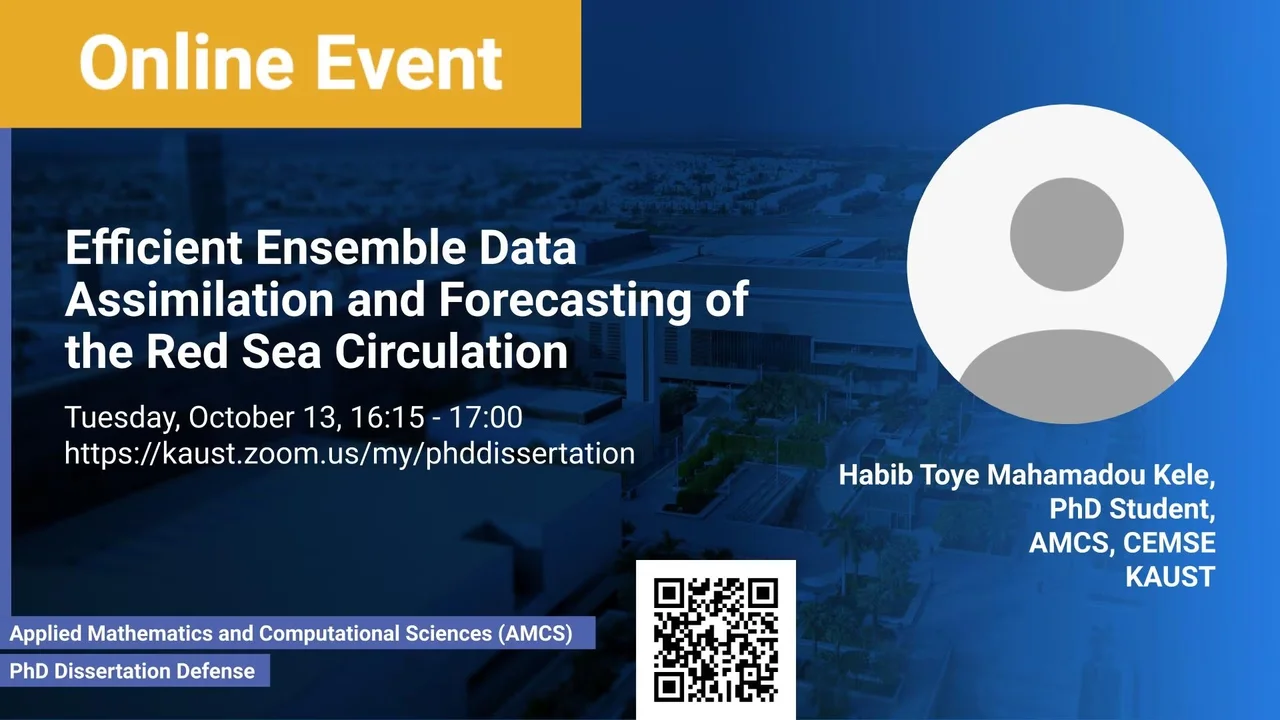
Efficient Ensemble Data Assimilation and Forecasting of the Red Sea Circulation
This dissertation presents our efforts to build an operational ensemble forecasting system for the Red Sea, based on the Data Research Testbed (DART) package for ensemble data assimilation and the Massachusetts Institute of Technology general circulation ocean model (MITgcm) for forecasting. The Red Sea DART-MITgcm system efficiently integrates all the ensemble members in parallel, while accommodating different ensemble assimilation schemes. The promising ensemble adjustment Kalman filter (EAKF), designed to avoid manipulating the gigantic covariance matrices involved in the ensemble assimilation process, possesses relevant features required for an operational setting. We developed new schemes aiming at lowering the computational burden while preserving reliable assimilation results. The ensemble data assimilation system is implemented and tested on Shaheen, our world-class supercomputer, and will form the basis of the first ever operational Red Sea forecasting system that is currently being implemented to support Saudi Aramco operations in this basin.
Overview
Abstract
This thesis presents our efforts to build an operational ensemble forecasting system for the Red Sea, based on the Data Research Testbed (DART) package for ensemble data assimilation and the Massachusetts Institute of Technology general circulation ocean model (MITgcm) for forecasting. The Red Sea DART-MITgcm system efficiently integrates all the ensemble members in parallel, while accommodating different ensemble assimilation schemes. The promising ensemble adjustment Kalman filter (EAKF), designed to avoid manipulating the gigantic covariance matrices involved in the ensemble assimilation process, possesses relevant features required for an operational setting. The need for more efficient filtering schemes to implement a high resolution assimilation system for the Red Sea and to handle large ensembles for proper description of the assimilation statistics prompted the design and implementation of new filtering approaches. Making the most of our world-class supercomputer, Shaheen, we first pushed the system limits by designing a fault-tolerant scheduler extension that allowed us to test for the first time a fully realistic and high resolution 1000 ensemble members ocean ensemble assimilation system. In an operational setting, however, timely forecasts are of essence, and running large ensembles, albeit preferable and desirable, is not sustainable. New schemes aiming at lowering the computational burden while preserving reliable assimilation results, were developed. The ensemble Optimal Interpolation (EnOI) algorithm requires only a single model integration in the forecast step, using a static ensemble of preselected members for assimilation, and is therefore computationally significantly cheaper than the EAKF. To account for the strong seasonal variability of the Red Sea circulation, an EnOI with seasonally-varying ensembles (SEnOI) was first implemented. To better handle intra-seasonal variabilities and enhance the developed seasonal EnOI system, an automatic procedure to adaptively select the ensemble members through the assimilation cycles was then introduced. Finally, an efficient Hybrid scheme combining the dynamical flow-dependent covariance of the EAKF and a static covariance of the EnOI was proposed and successfully tested in the Red Sea. The developed Hybrid ensemble data assimilation system will form the basis of the first ever operational Red Sea forecasting system that is currently being implemented to support Saudi Aramco operations in this basin.
Brief Biography
Habib Toye is a PhD candidate at King Abdullah University of Science and Technology (KAUST), in the Computer, Electrical and Mathematical Sciences and Engineering Division (CEMSE) under the supervision of Professor Ibrahim Hoteit. His research interests include Ensemble ocean forecasting, High performance computing and Data assimilation.